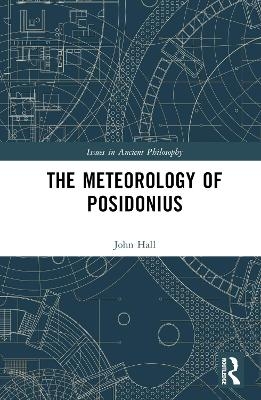
The Meteorology of Posidonius
Routledge (Verlag)
978-0-367-02372-0 (ISBN)
This volume describes the meteorology of the Stoic philosopher Posidonius from the existing fragments, and discusses his relation to earlier thinkers on this subject, as well as the methods he used to obtain information about and to find explanations of meteorological phenomena.
The book examines ancient meteorology, an aspect of ancient thought largely neglected by scholars. Hall produces a detailed account of how Posidonius and other ancient thinkers approached and attempted to explain meteorological phenomena – phenomena familiar to everyone, which could not be ignored in attempts to understand the natural world, but were difficult to explain satisfactorily and convincingly despite the efforts of important ancient thinkers. The volume explores particular classes of phenomena, including climatic events and geological processes, providing a comprehensive overview of Posidonius’ ideas on these topics. Concluding chapters allow for an assessment of Posidonius’ particular contribution to the field and his influence on later writers working on this subject.
The Meteorology of Posidonius provides an important resource for students and scholars working on ancient philosophy and ancient science, particularly ancient meteorology.
J.J. Hall read Classics at Trinity College, Cambridge, and then did research, gaining a Ph.D. for a dissertation on ancient theories of wind. His career was spent on the staff of Cambridge University Library. Now retired, and still in Cambridge, U.K., he has written this book.
1. The definition of "meteorology" used in this book; 2. The biography and later reputation of Posidonius; 3. Sources for the study of Posidonius’ meteorology; 4. The history of Greek meteorology before Posidonius; 5. Earlier authors on meteorology used by Posidonius; 6. The region in which meteorological phenomena occur; 7. Climatic zones; 8. Thunder and lightning; 9. Lights in the sky: comets, the Milky Way and other phenomena; 10. Exhalations; 11. Winds; 12. Earthquakes and volcanoes; 13. The sea and its tides; 14. Rain, snow, hail and cloud; 15. Rivers: the Nile floods; 16. Rainbows, haloes and mock-suns; 17. Weather prediction and divination; 18. Meteorology and Providence; 19. Epicurean meteorology compared with that of the Stoics; 20. The place of meteorology among the different branches of knowledge; 21. Sources and methods in Posidonius’ meteorology; 22. Assessment of the meteorology of Posidonius and his successors.
| Erscheinungsdatum | 01.08.2023 |
|---|---|
| Reihe/Serie | Issues in Ancient Philosophy |
| Zusatzinfo | 2 Line drawings, black and white; 2 Illustrations, black and white |
| Verlagsort | London |
| Sprache | englisch |
| Maße | 156 x 234 mm |
| Gewicht | 453 g |
| Themenwelt | Geschichte ► Allgemeine Geschichte ► Altertum / Antike |
| Geisteswissenschaften ► Philosophie ► Philosophie Altertum / Antike | |
| Naturwissenschaften | |
| ISBN-10 | 0-367-02372-5 / 0367023725 |
| ISBN-13 | 978-0-367-02372-0 / 9780367023720 |
| Zustand | Neuware |
| Informationen gemäß Produktsicherheitsverordnung (GPSR) | |
| Haben Sie eine Frage zum Produkt? |
aus dem Bereich


